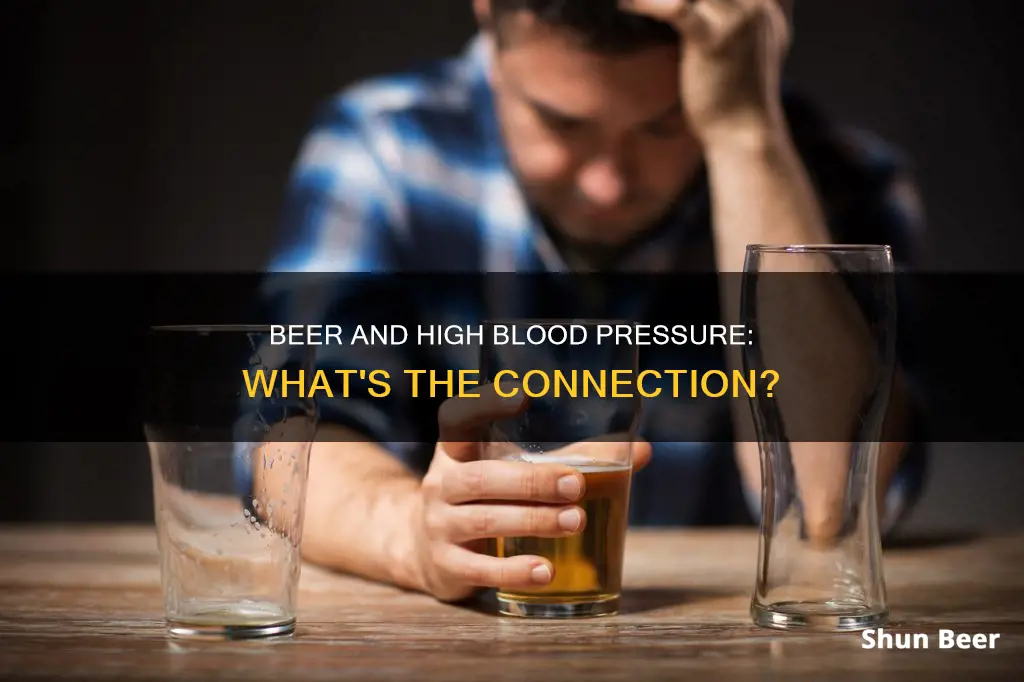
Drinking alcohol can have a serious long-term effect on blood pressure. Alcohol consumption is a preventable cause of hypertension in both men and women. Drinking too much alcohol can raise your blood pressure, and if you have high blood pressure, your healthcare professional may ask you to cut back on drinking.
The American Heart Association recommends no more than two drinks per day for men and one drink per day for women. However, it is important to note that the decision to drink or not depends on a person's entire health profile.
Alcohol can interact with high blood pressure medications and cause side effects such as dizziness, fainting, and irregular heartbeat. It is always a good idea to consult a doctor about how your high blood pressure and overall health can determine your alcohol consumption choices.
| Characteristics | Values |
|---|---|
| Alcohol's effect on blood pressure | Alcohol can cause a temporary spike in blood pressure, and long-term consumption can lead to sustained high blood pressure. |
| Amount of alcohol | Low doses of alcohol (1 drink) do not affect blood pressure in the short term. Binge drinking (5+ drinks for men, 4+ for women in 2 hours) can cause a temporary spike. |
| Alcohol's effect on substances in the body | Alcohol causes the release of substances like nitric oxide, which cause blood vessels to widen and lower blood pressure. |
| Time since last drink | Around 13 hours after the last drink, blood pressure can rise, especially if a large amount of alcohol was consumed. |
| Long-term effects | Regular, heavy drinkers are more likely to develop chronic high blood pressure. Moderate drinkers (7-13 drinks/week) are twice as likely to develop hypertension. |
| People with diabetes | People with diabetes who drink heavily (more than 15 drinks/week) are three times as likely to develop high blood pressure. |
| Effect on nervous system, kidneys, and blood vessels | Alcohol causes the brain to release adrenaline, which raises blood pressure and heart rate. It also increases calcium and cortisol levels, causing blood vessels to narrow and blood pressure to rise. |
| Baroreceptors | Alcohol interacts with sensors in the brain stem, impairing baroreceptor control and increasing sympathetic activity, which raises blood pressure. |
| Weight gain and diabetes | Alcoholic drinks are high in calories and sugar, contributing to weight gain and diabetes, which are linked to high blood pressure. |
| Interaction with blood pressure medications | Alcohol can interact with high blood pressure medications, causing dizziness, fainting, and irregular heartbeat. |
| Recommended intake | The American Heart Association recommends no more than 2 drinks/day for men and 1 drink/day for women. |
What You'll Learn

Alcohol's effect on the nervous system, kidneys, and blood vessels
Alcohol is a central nervous system depressant. This means that it slows down brain activity and can change your mood, behaviour, and self-control. It can also affect your coordination and physical control.
Alcohol can also have an impact on your blood pressure and heart rate. Binge drinking, which is classified as consuming so much alcohol that your blood alcohol concentration (BAC) level is 0.08% or more, can cause a transient increase in blood pressure. Binge drinking is usually around 5 or more drinks within a few hours for men, and 4 or more drinks within a few hours for women.
Chronic alcohol consumption may also cause an increase in body fluid volume, which can contribute to high blood pressure. This is due to the accumulation of both fluid and solutes in the body.
Acute and chronic alcohol consumption can also compromise kidney function, particularly in conjunction with established liver disease. Alcohol can alter the form and structure of the kidneys, impair their ability to regulate fluid and electrolyte levels in the body, and disrupt the hormonal control mechanisms that govern kidney function.
Overall, while moderate alcohol consumption may have some benefits, excessive drinking can negatively affect the nervous system, kidneys, and blood vessels, leading to increased blood pressure and other health issues.
Beer and Tramadol: A Safe Mix?
You may want to see also

Alcohol's interaction with high blood pressure medications
Alcohol can interact with certain drugs or exacerbate the medical and mental health conditions you're being treated for. It is generally advisable to avoid drinking alcohol when taking medications, as mixing the two can lead to serious health consequences, including overdose and even death.
If you are taking medication for high blood pressure, drinking alcohol can cause orthostatic hypotension, which is low blood pressure when you stand up from a sitting or lying-down position. This may lead to dizziness, lightheadedness or fainting. These effects can be worse at the beginning of treatment or when increasing your dose.
Alcohol can also cause heart rhythm problems (arrhythmias) when mixed with many common medications for high blood pressure, including lisinopril (Zestril) and amlodipine (Norvasc).
Drinking alcohol while taking beta-blockers, such as metoprolol (Lopressor) and atenolol (Tenormin), is also not recommended. Beta-blockers work by slowing down your heart rate, and side effects like dizziness, lightheadedness, and fainting are common. When mixed with alcohol, you are likely to feel these side effects more intensely. There is also a concern that alcohol makes beta-blockers less effective at lowering blood pressure.
Additionally, alcohol can affect liver enzymes, which are responsible for how medicines are changed in the body before they are excreted. This can alter drug levels in your bloodstream, making medication side effects worse or lowering the effectiveness of your medicine.
If you are taking medication for high blood pressure, it is important to consult with your doctor or pharmacist about the possible interactions with alcohol. They can provide personalized guidance based on your specific medications and health status.
Beer and Forteo: Is it Safe to Drink?
You may want to see also

Alcohol's effect on weight gain and diabetes
Drinking alcohol can have a serious long-term effect on blood pressure. Alcohol consumption is a preventable cause of hypertension, which is the medical term for sustained high blood pressure. Hypertension puts a strain on your arteries and heart, increasing the risk of a heart attack, stroke, or kidney disease.
Now, here is some information on alcohol's effect on weight gain and diabetes:
Alcohol's Effect on Weight Gain
Alcohol may cause weight gain if consumed in excess. Heavy drinking may activate hormones that signal appetite, hunger, and stress. Alcohol is also high in calories but lacks nutrients that support good health. However, light-to-moderate alcohol consumption does not cause weight gain.
The National Institute on Alcohol Abuse and Alcoholism (NIAAA) defines heavy drinking as more than three drinks per day or seven drinks per week for females, and more than four drinks per day or 14 drinks per week for males.
Alcohol may affect the functions of glands that release hormones, which can cause weight gain. For example, heavy drinking may cause the adrenal glands to secrete high levels of cortisol, a stress hormone that increases abdominal weight gain and cravings for high-calorie foods.
Additionally, alcohol impacts the way the body burns fat. When you drink alcohol, your liver breaks down alcohol instead of fat. As a result, fat may accumulate in the abdominal region, leading to health complications.
Alcohol's Effect on Diabetes
Alcohol can interfere with diabetes management and worsen blood sugar control. It can cause blood glucose levels to rise or fall, depending on how much you drink. Alcohol also prevents the liver from regulating blood sugar effectively.
People with diabetes should be cautious when drinking alcohol, as it can worsen some diabetes complications. Alcohol can interact with diabetes medications, leading to hypoglycemia or "insulin shock," which is a medical emergency.
It is important for people with diabetes to test their blood sugar levels before consuming alcohol and to never drink on an empty stomach. Food slows down the absorption of alcohol into the bloodstream. Additionally, drinking alcohol with diabetes medication, especially on an empty stomach, may cause low blood sugar.
The Magic of Appearing Beer: Trick Explained
You may want to see also

Alcohol's impact on the release of hormones like adrenaline
Drinking alcohol can have a serious long-term effect on blood pressure. Alcohol consumption is a preventable cause of hypertension in both men and women. Untreated high blood pressure increases your risk of a stroke, heart attack, or kidney disease.
Alcohol is associated with increased cortisol levels in the body. Cortisol is a stress hormone produced by the adrenal glands, which are located at the top of each kidney. Adrenaline, also known as the fight-or-flight hormone, is also produced by the adrenal glands. Adrenaline is released in response to a stressful, exciting, dangerous, or threatening situation. It increases heart rate, blood flow to the brain and muscles, and stimulates the body to produce sugar for fuel.
Research has shown that alcohol consumption increases the body's production of cortisol, both while the person is intoxicated and during alcohol withdrawal. High cortisol levels can increase the risk of high blood pressure, as well as diabetes, weight gain, cardiovascular disease, gastrointestinal problems, poor immunity, fatigue, and fertility problems.
Chronic heavy drinking can lead to elevated cortisol levels, even during periods of alcohol withdrawal. This can be due to the shock of suddenly stopping alcohol consumption, which can be a significant stressor for individuals with alcohol use disorder. Additionally, alcohol may affect brain chemicals that signal the adrenal glands to produce more cortisol.
Alcohol use also impairs the hypothalamic-pituitary-adrenal (HPA) axis, a neuroendocrine mechanism that mediates the impact of stressors on the body. The HPA axis regulates the autonomic nervous system, immune response, metabolism, and other physiological processes. Increased activity in the HPA axis due to alcohol consumption results in higher cortisol production. This increase in cortisol also triggers the release of dopamine, contributing to the pleasurable effects of alcohol consumption.
In summary, alcohol consumption is linked to increased cortisol levels, which can lead to a range of negative health consequences, including high blood pressure. Alcohol's impact on the HPA axis and its ability to stimulate the release of cortisol and other hormones can have significant effects on the body, including elevated blood pressure.
Marijuana and Beer: Mixing Effects and What You Should Know
You may want to see also

Alcohol's role in increasing calcium levels
Alcohol consumption can have a significant impact on calcium levels in the body, which in turn can affect bone health and strength. While calcium levels in the blood typically remain stable, heavy and chronic alcohol intake can disrupt this balance.
Firstly, alcohol abuse is associated with hypocalcemia, or low calcium levels in the blood. This can be attributed to several factors related to alcoholism, rather than alcohol itself. A damaged liver, for instance, may fail to produce the enzyme required to convert vitamin D into its active form, which is essential for calcium absorption. Poor fat absorption, another consequence of heavy drinking, further impairs calcium absorption as both vitamin D and calcium are fat-soluble.
Additionally, alcoholism is linked to decreased testosterone hormone production, particularly in men. Androgens, or male hormones, play a crucial role in preserving bone mass. As a result, alcoholics often exhibit significantly reduced bone mass compared to non-alcoholics.
Furthermore, increased cortisol levels in alcoholics contribute to bone loss. Elevated cortisol levels inhibit the formation of new bone tissue while stimulating bone breakdown. This combination of factors increases the risk of osteoporosis, or low bone density, which can lead to debilitating fractures, particularly in the hip and spine.
It is worth noting that alcohol-induced bone deficiencies may be reversible to some extent if alcohol consumption is ceased. However, the combination of poor nutrition and impaired absorption of calcium due to alcohol can lead to long-term deficiencies if left unaddressed.
Kayaking and Beer: Texas Rules and Regulations
You may want to see also
Frequently asked questions
Drinking beer and other alcoholic drinks can lead to high blood pressure. Alcohol causes the brain and nervous system to release hormones like adrenaline, which raises blood pressure and heart rate. Alcohol also increases calcium and cortisol levels, causing blood vessels to narrow and blood pressure to rise.
Yes, drinking beer can cause high blood pressure, especially in heavy drinkers or those who have been drinking for a long time. Alcohol increases the risk of other health complications, like excess weight and diabetes, which are also linked to high blood pressure.
Drinking beer is not recommended for people with high blood pressure as it can worsen their condition. Alcohol interacts with high blood pressure medications and can cause dizziness, fainting, and irregular heartbeat.
The American Heart Association recommends no more than two drinks per day for men and one drink per day for women. However, healthcare professionals generally advise avoiding alcohol if you are taking certain medications or have specific health conditions. It is best to consult your doctor about your alcohol consumption choices.







